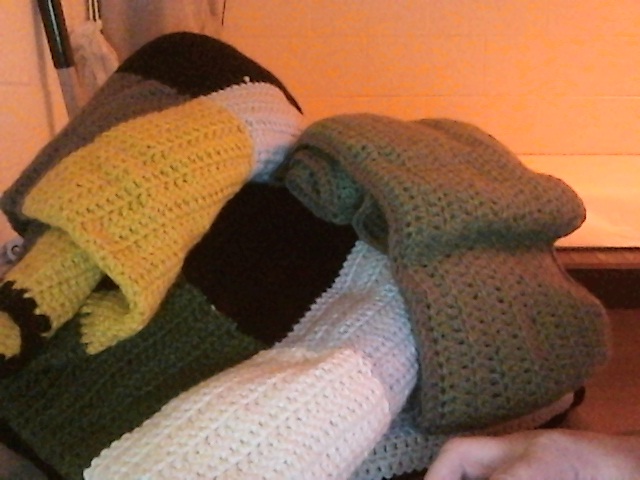Travis learned to crochet from his grandmother. He was 10 when she showed him his first stitch, in 1986, and kept up the craft into adulthood. When he was incarcerated a few years ago in Tennessee, he found himself in a facility where prisoners were allowed to purchase crochet hooks and yarn. The hooks were plastic, so as to be too flimsy for use as a weapon, and the colors were the ones left after all the “gang-associated” options had been removed, but it still gave him a hobby.
“This crazy place had my stomach constantly tore up,” he told Filter. “I found that crocheting calmed my nerves. [It] took my mind away from all the violence going on around me, and let me concentrate on a simple thing that I could handle.”
Travis became a regular fixture at a table in the dayroom where prisoners in our living unit come to play cards or just chat. From the end of his crochet hook emerged hats, socks and scarves. They soothed his stomach and furnished his loved ones with heartfelt gifts. Neighbors began commissioning items they could send to their loved ones, too. Often when someone first approached Travis, he’d ask if they’d like to learn how to do it themselves. Before long, the dayroom had an entire table full of men busily crocheting.
Though corrections staff often don’t permit prisoners to gather in groups, they didn’t interfere with crochet club.
When Martin first came to prison, he just wanted to sleep the time away until he could be home again. Then his wife died. Except to go to chow, he almost never left his cell until one day when his cellie persuaded him to come out to the dayroom. Suddenly, Martin was making a baby blanket for his new granddaughter.
“I felt so lost and disconnected from the world,” he told Filter. “I didn’t want to live anymore. The guys in the group allowed me to vent and talk about my wife and family … we talked, stitched and slowly I felt like a human being again. And wanted to be a part of something.”
Corrections staff often don’t permit prisoners to gather in groups, a natural human behavior that for us is interpreted as “gang-related activity.” But the officers didn’t interfere with what became informally known as “crochet club.”
All kinds of troubles brought people to the dayroom table. For Matthew, it was his arthritis. Like many prisoners who live with chronic pain, the best he could hope for was overpriced Tylenol. It didn’t help. He was willing to try anything, but when he first sat down at the crochet table he wasn’t optimistic. The pain in his hands was so bad he could barely hold a pen—how was he going to crochet?
“It was like learning a foreign language,” he told Filter. “I felt like I would never be able to move my fingers like they needed. But I stayed with it, mainly because the guys were so much fun to be around.”
Gradually, his fingers relaxed. His arthritis pain eased. It migrated to his shoulder, but his hands feel fine now.
The crochet table has been an oasis of calm rarely seen inside prisons.
Research on crochet inside prisons is essentially nonexistent. But the few outside studies on the craft’s positive effects have revealed similar findings: alleviation of physical and emotional pain; the soothing nature of repetitive motion; generating or increasing interpersonal connection; and increased self-worth from creating something of value for others.
Carlos joined the crochet club because he was angry. Angry at himself for ending up in prison; for not being there for his family when the needed him.
“I was so angry all the time. I crack my hand on so many walls just needing to hit something,” Carlos told Filter. “I saw all these guys sitting around the table talking and laughing all the time like they didn’t have a care in the world, and I needed some of that.”
Soon he was churning out hats, and with them a new way to connect with his kids. Being able to send them gifts he’d made with his own two hands gave him with a sense of accomplishment. The time he spent with the other crochet club members gave him a sense of belonging. His anger got better.
Over the past three or so years, the crochet table has been a place where friendships are forged and tensions diffused. Where loneliness and grief are soothed by not just the tactile meditativeness of looping yarn over hook, but by community. An oasis of calm rarely seen inside prisons.
Photograph courtesy of Anonymous





Show Comments